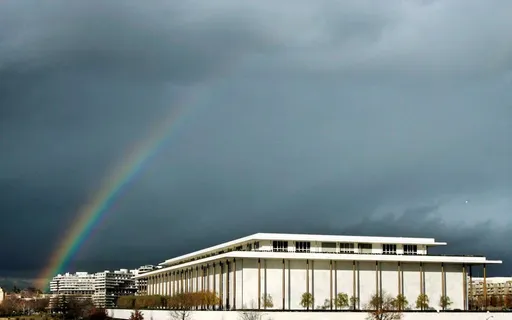Climate activists have spraypainted a superyacht, blocked private jets from taking off and plugged holes in golf courses this summer as part of an intensifying campaign against the emissions-spewing lifestyles of the ultrawealthy.
Climate activism has intensified in the past few years as the planet warms to dangerous levels, igniting more extreme heat, floods, storms and wildfires around the world.
Tactics have been getting more radical, with some protesters glueing themselves to roads, disrupting high-profile sporting events like golf and tennis and even splashing famous pieces of artwork with paint or soup.
They’re now turning their attention to the wealthy, after long targeting some of the world’s most profitable companies – oil and gas conglomerates, banks and insurance firms that continue to invest in fossil fuels.
“We do not point the finger at the people but at their lifestyle, the injustice it represents,” said Karen Killeen, an Extinction Rebellion activist who was involved in protests in Ibiza, Spain, a favourite summer spot for the wealthy.
She said the group is protesting unnecessary emissions, such as superrich individuals going to pick up a pizza by boat. “In a climate emergency, it’s an atrocity,” she said.
Killeen and others from climate activist group Futuro Vegetal — or Vegetable Future — spraypainted a $300 million superyacht belonging to Walmart heir Nancy Walton Laurie. Protesters held up a sign that read, “You consume, others suffer.”
In Switzerland, some 100 activists disrupted Europe’s biggest private jet sales fair in Geneva when they chained themselves to aircraft gangways and the exhibition entrance. In Germany, climate group Letzte Generation — which translates to Last Generation — spraypainted a private jet on the resort island of Sylt, in the North Sea.
In Spain, activists plugged holes in golf courses to protest the sport's heavy water needs during hot, dry spells.
In the US, Abigail Disney, the grand-niece of Walt Disney, was arrested at East Hampton Town Airport, New York, in July along with 13 other protesters for blocking cars from entering or exiting the parking lot.
It was the first of up to eight actions carried out in the exclusive Hamptons area. Activists also crashed a golf course, disrupted a museum gala and demonstrated outside some private luxury homes.
Lifestyle polluters
“Luxury practices are disproportionately contributing to the climate crisis at this point,” said University of Maryland social scientist Dana Fisher.
According to a 2021 report by the nonprofit Oxfam, if all planet-warming emissions were attributed to the people producing them, the richest 1 percent will be responsible for around 16 percent of emissions by 2030. “It makes a lot of sense for these activists to be calling out this toxic behaviour.”
Richard Wilk, an economic anthropologist at Indiana University, said luxury travel is “the real culprit” in the emissions of the ultrawealthy.
He published estimates of top billionaires’ annual emissions in 2021 and found that a superyacht — with a permanent crew, helicopter pad, submarines and pools — emits about 7,020 tons of carbon dioxide a year, over 1,500 times higher than a typical family car.
And private aircraft in Europe alone last year caused more than 3 million tons of carbon pollution, equivalent to the average annual CO2 emissions of over half a million EU residents, according to the nonprofit Greenpeace.
Missing the wood for the trees?
But Pennsylvania State University climate scientist Michael Mann warned that attention away from the fossil fuel companies — which are responsible for at least 70 percent of all emissions — and toward the rich could be “playing right into the hands of the fossil fuel industry and the ‘deflection campaign’ they’ve used to divert attention from regulation by emphasising individual carbon footprints over the much larger footprint of polluters.”
“The solution is to get everyone to use less carbon-based energy,” whether wealthy or lower-income people, he said.
David Gitman, president of Monarch Air Group, a Florida private air charter provider, encouraged activists to think twice about whether they're taking the right approach.
“If their activism goes toward some sort of actual assistance to real programs to make real change like sustainable aviation fuel, like carbon offsets, I think that this kind of activism can help achieve those results,” said Gitman.
“Now, if they go out and they spray-paint a private jet in an airport in Europe, is that going to get those results? In my opinion, no.”
Fisher, of the University of Maryland, was also sceptical that the activism was effective in changing the behaviour of the wealthy.
In some cases, governments have stepped in with regulations. France is cracking down on the use of private jets for short journeys, and earlier this year, the Netherlands' Schiphol Airport also announced plans to ban private jets.
But as protests escalate, Fisher and Wilk say they could still move the needle toward behaviour change.
“Public shaming is one of the most powerful ways of controlling people,” Wilk said. “It acts in a lot of different ways to embarrass people, to make them more conscious of the consequences of their actions.”
























